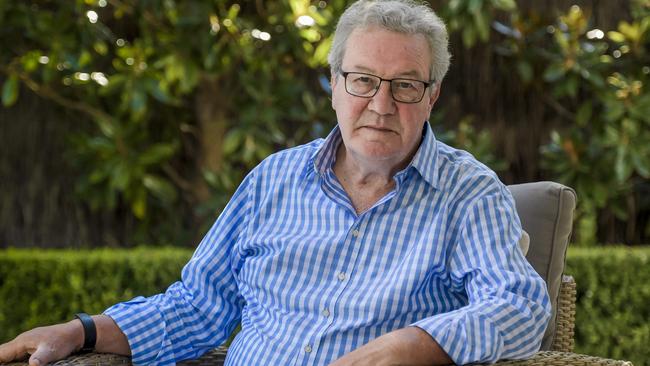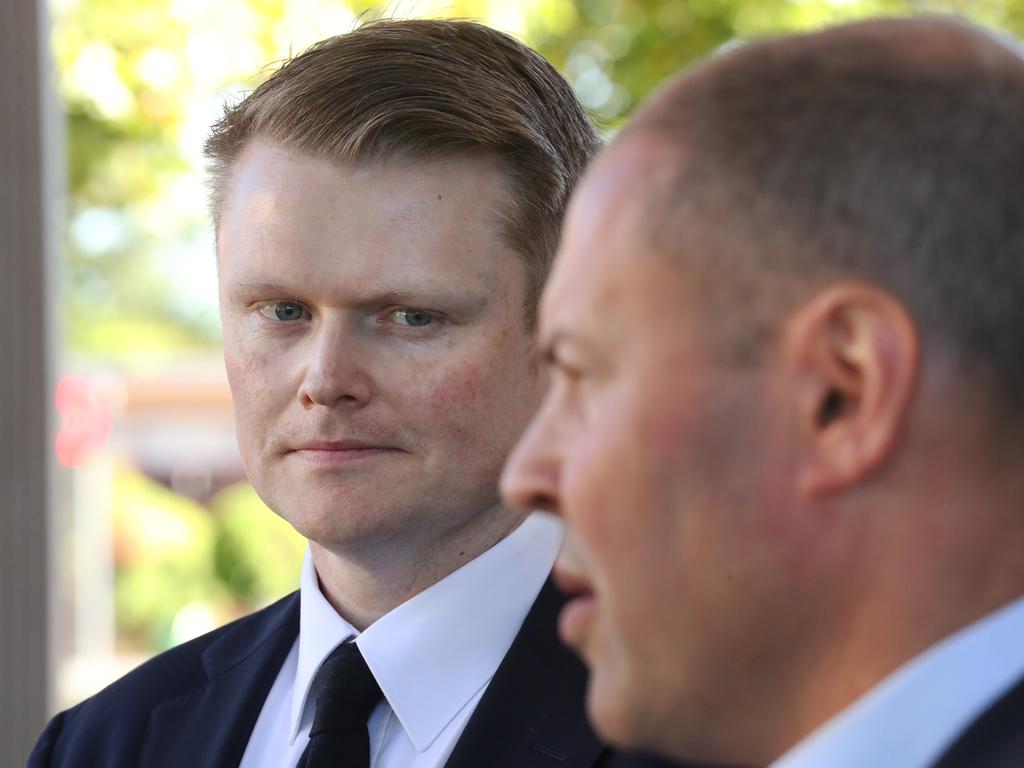Danger in paradise: we’re at risk of being Little Australia
Howard era foreign minister Alexander Downer has a stern warning for the lockdowners.

Undoubtedly, it’s been a long time between drinks. But the foreign minister during the Howard era doesn’t want to reflect on the past. Downer is one of very few former political leaders willing to speak frankly about our self-congratulatory approach to COVID-19. And he is not convinced that our leaders have a sensible exit plan.
Downer returned home to the salubrious Adelaide Hills in December having spent a large part of 2020 in London. He chairs Policy Exchange, one of London’s premier think tanks, and is also the full-time executive chairman of the International School for Government at Kings College London.
Living between London and Adelaide, Downer is struck by the differences. No one can overlook Britain’s tragic COVID-19 death rate, even though questions remain about how that death rate is compiled. By contrast, it is true, says Downer, that Australia has dealt with the virus very well “in the short term in its attempt to try to eradicate COVID”.
But the former foreign minister warns there are dangers lurking in paradise.
“The elimination strategy will never work,” he tells Inquirer over the phone from Adelaide this week.
“This will outrage most Australians. But I am absolutely convinced (that) the greatest danger for Australia is to keep pursuing this elimination strategy and, in the end, cause the collapse of the economy, massive social dislocation, depression, educational setbacks, and the collapse of small businesses left, right and centre.

“There will be no end of partisan blaming — the Liberals did it, or Labor did it.
No!” he says, firmly. “The public need to reflect on how we manage the risk of these kinds of pandemics. You have to keep society going. You have to keep schools open. You can’t keep closing things down because there is a case here and a case there.”
Downer’s words resonate in a week where 6.3 million Victorians were freed from another excessive five-day lockdown, only to be told by Victorian Premier Daniel Andrews that he would do it all again.
Downer describes arriving at Melbourne’s Tullamarine Airport hours before Andrews locked down the state, and other states shut their borders to Victoria.
“I turned up at Tullamarine and a policeman in a very dark uniform, friendly enough, asked to see my papers. I am thinking to myself, this sounds like Europe before 1989 and the tearing down of the Berlin Wall. ‘We want to see your papers!’
“This is in Australia,” he laments. And what concerns Downer is that “people think it’s wonderful”.
During our extended conversation, I suggest that he slow down. He is driving during the more colourful parts of our conversation. God forbid that Adelaide’s high-profile petrol head gets a speeding ticket or, worse. But his exasperation doesn’t pass.
“This idea that a state government can just lock down a whole state … in the case of Victoria because there are a handful of cases surrounding the Holiday Inn at Tullamarine Airport, people in Mildura are locked in their houses. The same has happened in South Australia, the whole state was locked down. In Western Australia, a case in Perth meant Albany, Bunbury and Broome were all locked down.
“My point is that it is not sustainable. We’ve got to start thinking about managing the risk.”
As a voracious consumer of all forms of media and social media, Downer is struck by the vigorous debates in Britain, including within the Conservative Party, about lockdowns. “There is constant evaluation in the UK of the damage to children’s education, to families working at home schooling their kids, the massive psychological pressure that lockdowns impose on people, the rise in mental health problems, the destruction of social contact,” he says. “In Australia? No debate.”
“Vaccinations will help,” he says, as Australia belatedly begins the roll out the Pfizer/BioNTech vaccine on Monday. “But it is not going to be possible to eliminate COVID. There will always be cases that creep in. Then what?
“The problem for Australia is … there is no plan for how we will live with COVID. It is impossible to cut Australia off from the rest of the world.”
What explains this? Fear? Complacency? Poor leadership?
Downer says Australians are noticeably more fearful than Britons. He thinks more people in Britain know someone who has had COVID, and they haven’t all “dropped dead”.
“COVID is not the Black Death. It is not going to wipe out a sizeable percentage of the population. It’s really dangerous for people with comorbidities, people who are old and frail. And they should be protected.
“But people here are bombarded with media stories the whole time. When there is a single case of COVID, people are suddenly frozen in fear. They think they are going to drop dead.
“They almost certainly will not drop dead,” he counters. “In many cases, they are asymptomatic so they’re nothing like dropping dead, not from COVID anyway.”
I ask Downer why he thinks Australians are more fearful?
“I’m older than you,” says the 69-year-old. “Our generation have grown up in pretty much the most desirable of imaginable circumstances, and so have our children. For people slightly older than me, there was a random chance that they could have been chosen to join the Australian Defence Force during the Vietnam War, but you didn’t have to go. There has been no conscription, no social pressure to go to war, no risk of being killed in wars, there has been no Great Depression, there have been occasional recessions but there has been, year after year, a steady increase in people’s living standards.”
He agrees that’s true of many other countries. “But it’s the first-time people here have had to face a challenge of this magnitude, and they have reacted very strongly and with a great sense of fear.”
The Guardian’s recent survey found that 71 per cent of Australians who were polled believe that the international border should stay shut for the duration of the COVID-19 crisis.
Downer has also noticed “among some people a sneering resentment about Australians who want to come back into their own country”.
His response? “No, I reject that. This is not about community sentiment. The community need to have it explained to them that part of being Australian is you have a right to come to your own country whenever you wish.
“It’s been one of our great strengths that Australians go overseas. They run companies, they work in the professions, they’re engineers and scientists and do all sorts of interesting things overseas. There is an old and wise saying that travel broadens the mind. It strengthens our country that people move out of the country for a while.”
Only days earlier, Downer tweeted this: “Surely politicians are aware Article 12 of International Convention on Civil and Political Rights guarantees all people a right to return to their own country. We have to allow Australians to come home if they want to.”
I ask him about leadership, then. He says the states are the real culprits because they control health, and a host of public servants required to manage hotel quarantine. “The states are doing a lot of polling that shows that the public do not want Australians to come back … and this week, Daniel Andrews said that Australians should only come into Australia on compassionate grounds. What sort of government would ever say that to its people?”
Ever the political warrior, Downer recalls the left’s former obsession with human rights. “I seem to remember these people on the political left were always going on about human rights and civil liberties and international conventions. These people couldn’t be less interested in civil liberties and intentional conventions today.”
I suggest to Downer that, sadly, this insular, parochial sentiment runs across politics and class, which means we are at risk of becoming a Little Australia.
Downer agrees. “We are withdrawing into ourselves. And our disengagement is popular because people are frightened. And they are not prepared to manage the risk,” he says.
He singles out NSW Premier Gladys Berejiklian for praise for her management of risk, and for carrying half the burden of overseas arrivals.
“The problem for Australia is going to be: do we ever open up Australia again? Do we ever become the internationally engaged country that we were from the early 80s until early 2020?
“I regard myself as a reasonably moderate sort of person. But I find nobody really agrees with me on this,” he laughs.
Maybe more Australians agree with him than he realises.





Asked to reflect on the 25th anniversary of the election of the Howard government next month, Alexander Downer doesn’t disappoint: “Missing us yet?”